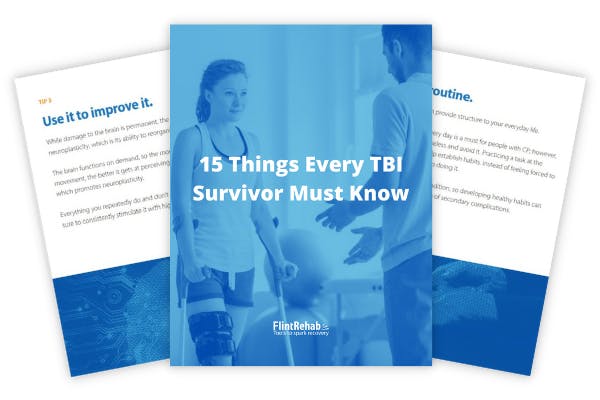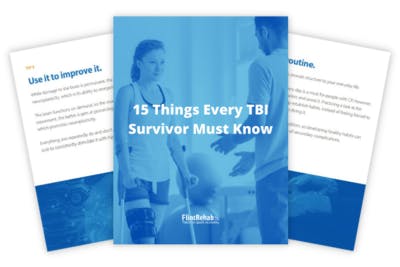No products in the cart.
No products in the cart.
No products in the cart.
No products in the cart.
Home » Neurological Recovery Blog » Traumatic Brain Injury » Lack of Insight After Brain Injury: Causes and Treatments for Anosognosia
Last updated on August 29, 2023

Lack of insight, also known as anosognosia, often causes significant problems for people affected by brain injury. This is because this secondary effect may impair a person’s self-awareness of their injury. In severe cases, the person might not even realize they have any disability at all.
Lack of insight can have a serious, negative impact on brain injury rehabilitation. That’s why it is crucial to learn ways to help your loved one manage their anosognosia and keep moving forward toward recovery.
To get you started, this article will help you learn the different causes of anosognosia after brain injury. Additionally, we will review different strategies to help the individual improve their self-awareness.
Insight (specifically of one’s own condition) is the ability of a person to recognize and reflect on their situation, thoughts, actions, and deficits. After a brain injury, especially an injury to the parietal lobe or frontal lobe, this skill is often significantly impaired. This is also a common secondary effect following a right hemisphere stroke.
When insight is impaired, the person can experience a condition known as anosognosia. Anosognosia refers to impaired self-awareness of one’s condition, commonly occurring after a stroke or TBI. This can also be described as the inability to perceive the reality of your condition.
This lack of insight occurs despite significant evidence of a disability. For example, the individual may be affected by significant physical impairments after their injury, but still be in denial that they have any deficits in function. It is important to note that this denial is different from the denial experienced as one of the five stages of grief. Even hearing a doctor explain the problem usually does not help the person accept it.
There are several reasons a person’s insight can be diminished after TBI or stroke. As mentioned previously, this is often the result of injury to the right hemisphere of the brain, specifically to the parietal or frontal lobes. For this reason, some of the most common causes of anosognosia and accompanying symptoms include:
All of these issues can coexist and contribute to a lack of insight after brain injury. This limited awareness of their physical, cognitive, behavioral, and personality changes after brain injury can have serious implications on a survivor’s recovery, as we will discuss next.
When an individual affected by brain injury does not fully understand the consequences of their injury, lack of insight can become dangerous. Additionally, anosognosia can hinder the individual’s recovery.
For example, when a survivor lacks the self-awareness to realize how serious their injury is, they often refuse to participate in therapy, believing they don’t need it. Unfortunately, this poor compliance can cause their recovery to plateau and they may even experience a regression.
In severe cases, a person with brain injury may be completely unaware of even serious physical difficulties, such as paralysis on one side of the body (hemiplegia). This can be dangerous if they try to get out of bed or their wheelchair on their own, despite not being able to walk independently. In fact, survivors with anosognosia have been shown to experience more frequent falls due to their lack of insight.
Unfortunately, this lack of self-awareness can also be accompanied by behavior changes, including aggressive behavior. When a survivor adamantly denies their impairments, they may become disgruntled or even aggressive with their caregivers or family members. While these behavior changes are generally a result of injury to the brain, this should be taken seriously. Caregivers should seek help from their healthcare team in cases of aggressive behavior.
Anosognosia is difficult to treat and usually requires the help of trained therapists and healthcare staff. However, less severe forms of this deficit can be successfully managed with the correct strategies.
Anosognosia can be challenging for both the individual and their caregivers or family. However, there are some strategies that can be useful to increase self-awareness and improve quality of life. The following are a few tips for family members and caregivers to help navigate a lack of insight after brain injury:
To help your loved one recover, family members should educate themselves on the nature of brain injury. Understand that even if it seems like the person is being stubborn or difficult, it’s often not intentional. Their brain injury and the resulting changes have made it difficult for them to understand their own behavior.
That’s why it is important to remain patient with your loved one and avoid arguing with them about their condition. If they insist there is nothing different about them or the situation starts to escalate, let the conversation drop for the moment.
Figuring out the reason why your loved one struggles with self-awareness can help you determine the best way to approach the problem. For example, if the primary issue is their attention or memory problems, then cognitive rehabilitative exercises may be beneficial. As their memory and concentration improve, their insight into their behavior may improve as well.
On the other hand, if their problem is more emotional, working with a counselor might help them come to terms with their injury. Participating in cognitive-behavioral therapy can help the survivor improve their awareness or find compensatory strategies.
Additionally, a licensed counselor may be able to provide the caregiver with strategies to make interactions at home more positive. For example, there may be certain “triggers” at home that often initiate negative interactions or increase frustration for the individual. If this is the case, it may be helpful to modify the environment and remove these triggers altogether.
When the person is in a calmer mental state, try to give them general information about brain injury and what kind of difficulties it causes. For example, instead of saying, “You are angry all the time.” Try saying “People with brain injury sometimes struggle with their temper. Have you ever felt that way?” This can make it feel less like a personal problem and can help avoid a defensive reaction.
It’s also a good idea to educate new friends on the effects of brain injury so they can understand the person’s behavior better. This helps to avoid negative interactions or misunderstandings between the individual and their new friends.
People with a lack of insight after brain injury often struggle to continue with therapy once they are released from the hospital. When the individual lacks awareness of their deficits, they often do not see the value of rehab exercises.
To help motivate your loved one to continue with therapy, try to relate their exercises to a concrete goal that they can easily grasp. For example, if they require assistance using the bathroom now, help them see how practicing arm, leg, and balance exercises can allow them to become more independent with toileting again.
Practicing activities that were once easy for the person but are now difficult can demonstrate to them that they still need to work on their abilities. This can be a delicate situation, as you don’t want to agitate or humiliate them. Consulting an occupational therapist can help you identify strategies to keep the person calm while maximizing their independence.
If you are having trouble motivating your loved one to participate in exercise, try getting them involved in a group activity or active hobby. For example, check your local community center or gym to see if there is an appropriate exercise class they can participate in safely. Alternatively, try incorporating their favorite hobby into their exercises. This could include gardening, woodworking, or listening to music.
Finally, it’s important to provide frequent, gentle feedback about the person’s abilities or behavior. If they want to do something that they are not able to do, such as drive, gently tell them that a brain injury makes that less safe. If they still insist, tell them it’s against the law to drive without a doctor’s permission.
Most importantly, keep their keys away from them and doors locked to make sure they do not make attempts to drive when it is unsafe. Once again, do not argue or dwell on their difficulties, as that may only make things worse. Try redirecting them to a different topic or activity to de-escalate the situation.
When they make improvements, congratulate them on the progress they have made, but not in a way that is patronizing. Even in the presence of cognitive impairments, TBI patients can often tell when they are being talked down to. Speak to them as an equal and celebrate their successes with them in a way that is positive and encouraging.
Anosognosia, or a lack of insight after brain injury, can be frustrating for both the survivor and their caregivers. This is often accompanied by impaired awareness of symptoms, even those that seem obvious or dramatically limit physical function. In addition to this lack of insight, anosognosia can be accompanied by other symptoms including memory loss or poor attention.
To help navigate anosognosia, it is important to find strategies to help redirect the individual and de-escalate frustrating interactions. Additionally, it can be helpful to find exercises that are meaningful to the individual and incorporate their hobbies to help increase compliance during recovery. Focus on encouraging progress and providing positive feedback to bolster your relationship with the individual.
While the advice in this article can get you started on the road to overcoming a lack of insight, family members and loved ones should also make sure to seek professional help. A therapist or neuropsychologist can provide tips that are tailored to the person’s unique situation.
Furthermore, a licensed therapist can also assist you with your own emotional recovery. This can help you avoid caregiver burnout, which is unfortunately common after a traumatic event. Seek support groups or other caregiver resources to help you as you navigate this major life change.
Lack of insight is a difficult cognitive impairment to overcome. However, with the right strategies and support, both the individual and caregiver can experience positive changes in independence and quality of life after brain injury.

If you like our content, you’ll love our ebook and newsletters! Get instant access to our TBI recovery tips ebook with 20 pages of helpful advice by signing up below.
You’ll also receive our emails that share survivor stories and more useful TBI recovery tips, which you can opt out of at any time. (We know you’ll love them, too.)
We will never sell your email address, and we never spam. That we promise.


Time with a speech therapist is extremely valuable during recovery, especially if you struggle with communication, critical thinking, or memory after brain injury. Insurance typically covers speech therapy for a fixed amount of time. But once it’s over, recovery is in your hands.
That’s why a team of neuroscientists and clinicians from Boston University created the CT Speech & Cognitive Therapy app. Designed for those recovering from stroke, TBI, or living with neurological conditions, the app contains over 100,000 cognitive exercises that are all available right from your phone or tablet. That’s like having a speech therapist by your side whenever you want!
This app is the perfect fit if you want to improve your speaking, memory, or general mental sharpness. And, it’s affordable at just $29.99/month!
“For the past 6 months, my son has used the app about three times a week. The app is like a virtual therapist, it’s very easy to use, and it gives him immediate feedback.
He now understands things faster, can make decisions with less hesitation, has improved recognition of words, and his confidence is higher. I also find it easy to get in touch with customer service; they pleasantly help out. The whole experience has been great.”
— Miriam
With the CT App, you can get the guidance you need right from your phone or tablet. You can use it on your own or in between sessions with your speech therapist.
Whether you struggle with aphasia, memory loss, or critical thinking, the CT Speech & Cognitive Therapy App can help.
“The CT app has helped me gather my confidence by building on and reinforcing old forgotten skills. It helps to see my percentages increase, and work harder when they decrease. It’s very self-motivating.” -Kathryn
We are confident that this app will help improve your speech and cognitive function after brain injury. Like our recovery tools, the CT App is also covered by our 30-day money-back guarantee.

Do you know these 15 TBI recovery tips?
Get a free copy of our ebook 15 Things Every TBI Survivor Must Know. Click here to get instant access.
Grab a free rehab exercise ebook!
Sign up to receive a free PDF ebook with recovery exercises for stroke, traumatic brain injury, or spinal cord injury below: